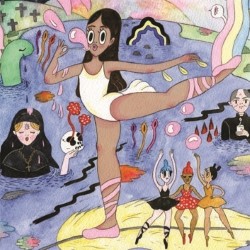Containing a rather unlikely mix of ballet, drug addiction and religion as its subject matter, Swan Bake is a hectic, irreverent look at the insidiousness of artificial intoxicants and the danger of following one’s dreams. After falling under the tyrannical grip of fictional drug “nonce”, Bell is quickly kicked out of ballet school and shacks up with her lesbian partner Maria, who happens to be a nun also suffering from a crippling nonce addiction. Completing the trio of oddball characters is Father Rupert, an unhinged egomaniac who acts as their landlord and bends others to his will with manic callousness.
If the characters sound caricatured and the story implausible, just wait until you see how things pan out; in creating Swan Bake, Second Sons Theatre Company have really gone off the deep end. Believability is sacrificed for shock value and outlandish plot twists, with Alex Stevens’ Father Rupert in particular an over-the-top representation of an arch villain. Imagine Sideshow Bob in the brief moments when the lights dim, the narrative is suspended and his villainous profile is uplit from below, and you’ll have an idea of how Stevens conducts himself throughout. Indeed, if he carries on like that, he’ll no doubt do himself a mischief before the age of 30; the sweat pouring off the man by the show’s end is perhaps the most obscene thing about it.
These exaggerated displays of ostentation are at once a strength and setback. Though some of them work very well – such as the hallucinatory scene involving the Pope of rats and a menacingly lap-dancing gimp – the relentless surrealism and cartoonishness of the show can become overwhelming by its end. But for all its silliness, it seems Swan Bake is still trying to say something of value and gravitas. Perhaps the most powerful monologue is delivered by the boss of the Royal Ballet School, who (in superbly executed puppet form) delivers a tirade on modern society in between guzzling cocaine and vomiting cotton wool.
Bell also delivers a lengthy speech on the futility of pursuing a career in the arts (which works well) and Maria gives a foul-mouthed invective against the hypocrisy of religion (which does to a lesser extent) but on the whole, the script is a little too reliant on swears and shocks to make you really take much away from it. There appears to be a general “Don’t do drugs because drugs are bad, m’kay” vibe to the story, but with events spiralling firmly out of control, and, indeed, the realms of believability, there’s every chance you’ll leave the auditorium both drained and entertained.
